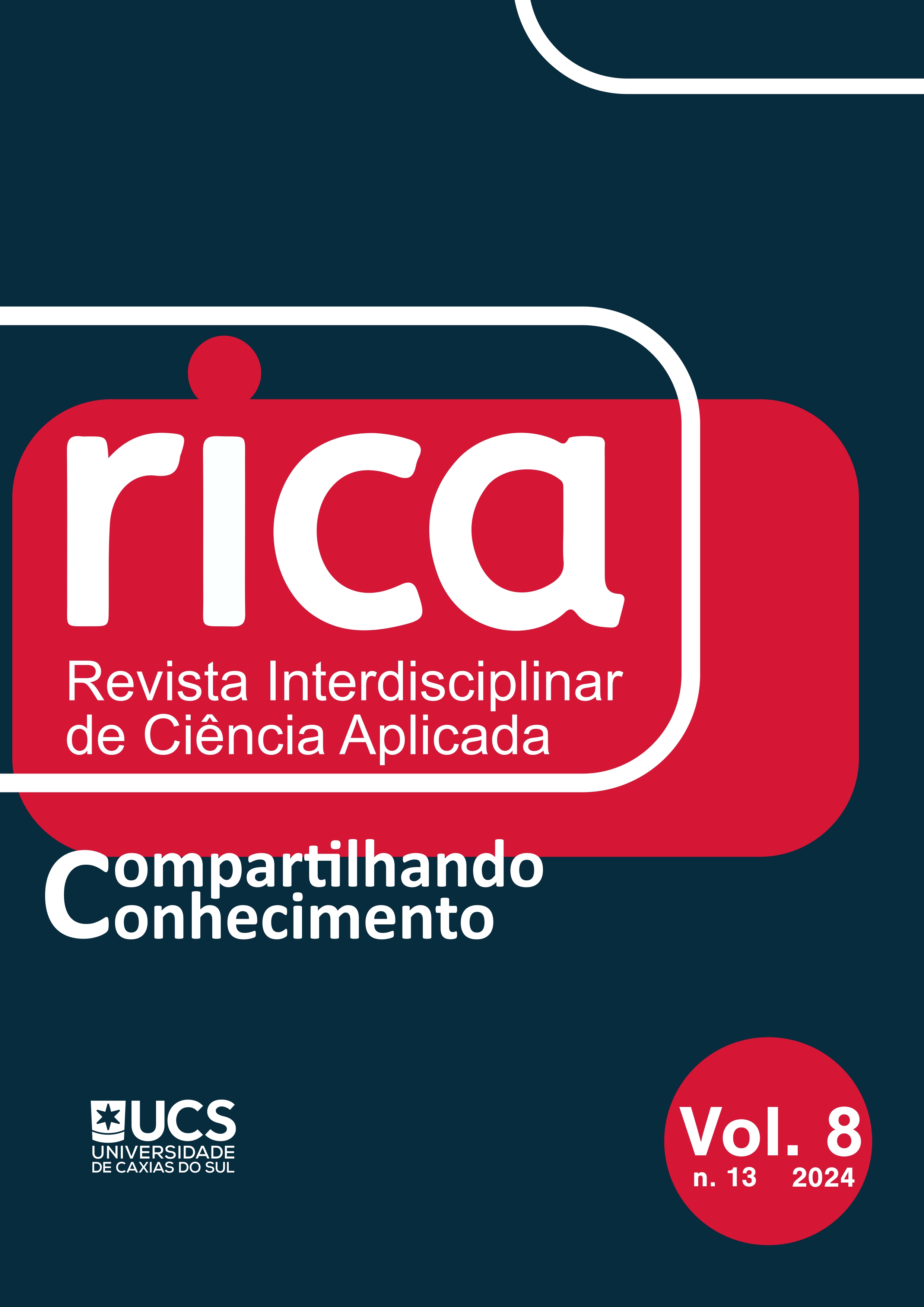Research on the impact of artificial intelligence on financial security in the context of modern technological challenges
DOI:
https://doi.org/10.18226/25253824.v8.n13.08Keywords:
Innovation, Global trends, Machine learning, Risks, Information security, BiasAbstract
The ambiguous nature of the consequences of the introduction of artificial intelligence necessitates the investigation of its benefits and risks in the context of financial security. The purpose of this study was to assess the existing prospects and risks of introducing artificial intelligence in the area of financial security of companies and institutions and to develop mechanisms to mitigate the identified problems. The study employed the statistical method, the predictive method, the descriptive method, the methods of analysis and synthesis, and the qualitative method. The study identified the main promising areas for the introduction of artificial intelligence, including detecting anomalies, improving payment procedures, authenticating documents, minimising errors, providing advice on making best investment decisions. The principal disadvantages identified included risks to the security of information and personal data, the risk of bias, injustice and discrimination, job displacement, and the loss of people’s working skills. But of particular concern are the long-term global consequences of artificial intelligence’s impact on society as a whole, and doubts about the ability to control it. To mitigate the identified risks, the study proposed to use the Senior Managers and Certification Regime (SM&CR) tool, which makes it possible to hold employees accountable for their behaviour and competence. The need was also emphasised for the company’s management to be fully aware of all aspects of artificial intelligence implementation, including its type, associated risks, opportunities, impact on all stakeholders. The findings of this study can be useful in the practice of companies and institutions planning to implement artificial intelligence to raise awareness of the benefits, risks and their minimisation.
References
Ntoutsi, E., Fafalios, P., Gadiraju, U., Iosifidis, V., Nejdl, W., Vidal, M., Ruggieri, S., Turini, F., Papadopoulos, S., Krasanakis, E., Kompatsiaris, I., Kinder‐Kurlanda, K., Wagner, C., Karimi, F., Fernandez, M., Alani, H., Berendt, B., Kruegel, T., Heinze, C., Broelemann, K., Kasneci, G., Tiropanis, T. & Staab, S. (2020). Bias in data‐driven artificial intelligence systems – An introductory survey. WIREs Data Mining and Knowledge Discovery, 10(3), e1356.
Safdar, N.M., Banja, J.D. & Meltzer, C.C. (2020). Ethical considerations in artificial intelligence. European Journal of Radiology, 122, 108768.
Joyce, K., Smith-Doerr, L., Alegria, S., Bell, S., Cruz, T., Hoffman, S.G., Noble, S.U. & Shestakofsky, B. (2021). Toward a sociology of Artificial Intelligence: A call for research on inequalities and structural change. Socius, 7, 1-11.
Cao, L. (2022). AI in finance: Challenges, techniques, and opportunities. ACM Computing Surveys, 55(3), 64.
Turchin, A. & Denkenberger, D. (2020). Classification of global catastrophic risks connected with artificial intelligence. AI & Society, 35(1), 147-163.
McLean, S., Read, G.J., Thompson, J., Baber, C., Stanton, N.A. & Salmon, P.M. (2021). The risks associated with artificial general intelligence: A systematic review. Journal of Experimental & Theoretical Artificial Intelligence, 35(5), 649-663.
Azarbekov, A.N. (2023). The concept of political power in the conditions of modernity. Proceedings of the National Academy of Sciences of the Kyrgyz Republic, 5, 26-30.
Sayakbayeva, A.A., Akylbekova, N.I. & Taalaibek, T. (2020). Digitalization as a platform for online business development in the banking sector of the Kyrgyz Republic. Actual Issues of Modern Economy, 9, 394-404.
Abdrasulova, Z. & Abdrasulova, S. (2022). Digitalization of the banking sector of the economy: Problems and ways of improvement. Journal of Osh State University. Economics, 1(1), 154-163.
Seitova, Z. & Tynych kyzy, N. (2022). Traditional and modern approaches to risk management in banks. Journal of Osh State University. Economics, 1(1), 171-178.
Khubieva, S. & Yugai, N. (2021). Main directions of development of digitalisation of public services in the Kyrgyz Republic in modern conditions. BSU Bulletin, 1(55), 156-159.
Azimov, Zh.M. & Ismailova, N.R. (2020). Development of Kyrgyzstan’s investment market in the context of digitalisation. Actual Issues of Modern Economy, 4, 685-695.
Global Artificial Intelligence market by solution (hardware, software, and services), by technology (deep learning, machine learning, NLP), by end-use (manufacturing, healthcare, law, BFSI, advertising & media, retail, agriculture, automotive & transportation, other end-uses), by region and key companies – Industry segment outlook, market assessment, competition scenario, trends and forecast 2023-2032. (2024). Retrieved from https://market.us/report/artificial-intelligence-market/#overview
Generative AI in financial services market revenue to be USD 9,475.2 Mn in 2032 | North America dominates with 40% of the market share. (2023). Retrieved from https://www.globenewswire.com/news-release/2023/06/12/2686443/0/en/Generative-AI-in-Financial-Services-Market-Revenue-To-Be-USD-9-475-2-Mn-in-2032-North-America-Dominates-with-40-of-the-Market-Share.html
World Economic Forum. (2023). Future of jobs report 2023: Insight report. Retrieved from https://www3.weforum.org/docs/WEF_Future_of_Jobs_2023.pdf
DP5/22 – Artificial Intelligence and Machine Learning. (2022). Retrieved from https://www.bankofengland.co.uk/prudential-regulation/publication/2022/october/artificial-intelligence
FS2/23 – Artificial Intelligence and Machine Learning. (2023). Retrieved from https://www.bankofengland.co.uk/prudential-regulation/publication/2023/october/artificial-intelligence-and-machine-learning
Helm, J.M., Swiergosz, A.M., Haeberle, H.S., Karnuta, J.M., Schaffer, J.L., Krebs, V.E., Spitzer, A.I. & Ramkumar, P.N. (2020). Machine learning and artificial intelligence: Definitions, applications, and future directions. Current Reviews in Musculoskeletal Medicine, 13(1), 69-76.
Trenker, J., Satkriti Menon, S., Tavva, N. & Blumtritt, C. (2023). If Big Data is the new oil, AI is the new electricity. Retrieved from https://www.statista.com/site/insights-compass-ai-ai-market-overview
Makarchuk, I., Malyshko, V. & Yaremenko, L. (2023). Financial security of enterprises: Characteristics, components, main threats and dangers. University Economic Bulletin, 56, 183-193.
Pratt, K. (2023). UK artificial intelligence (AI) statistics and trends in 2024. Retrieved from https://www.forbes.com/uk/advisor/business/software/uk-artificial-intelligence-ai-statistics-2023/
Nechyporenko, A. (2023). Features of financial risk management of the enterprise in the conditions of transformational changes. University Economic Bulletin, 56, 200-206.
Truby, J. (2020). Governing artificial intelligence to benefit the UN Sustainable Development Goals. Sustainable Development, 28(4), 946-959.
Galaz, V., Centeno, M.A., Callahan, P.W., Causevic, A., Patterson, T., Brass, I., Baum, S., Farber, D., Fischer, J., Garcia, D., McPhearson, T., Jimenez, D., King, B., Larcey, P. & Levy, K. (2021). Artificial intelligence, systemic risks, and sustainability. Technology in Society, 67, 101741.
Shanmuganathan, M. (2020). Behavioural finance in an era of artificial intelligence: Longitudinal case study of robo-advisors in investment decisions. Journal of Behavioral and Experimental Finance, 27, 100297.
Dowling, M. & Lucey, B. (2023). ChatGPT for (finance) research: The Bananarama conjecture. Finance Research Letters, 53, 103662.
Mhlanga, D. (2020). Industry 4.0 in finance: The impact of artificial intelligence (AI) on digital financial inclusion. International Journal of Financial Studies, 8(3), 45.
Bao, Y., Hilary, G. & Ke, B. (2022). Artificial intelligence and fraud detection. In: Innovative Technology at the Interface of Finance and Operations (pp. 223-247). Cham: Springer.
Al-Hashedi, K.G. & Magalingam, P. (2021). Financial fraud detection applying data mining techniques: A comprehensive review from 2009 to 2019. Computer Science Review, 40, 100402.
Ashta, A. & Herrmann, H. (2021). Artificial intelligence and fintech: An overview of opportunities and risks for banking, investments, and microfinance. Strategic Change, 30(3), 211-222.
El Hajj, M. & Hammoud, J. (2023). Unveiling the influence of artificial intelligence and machine learning on financial markets: A comprehensive analysis of AI applications in trading, risk management, and financial operations. Journal of Risk and Financial Management, 16(10), 434.
Krause, D. (2023). Adapting the finance curriculum for an AI-driven future. Retrieved from https://dx.doi.org/10.2139/ssrn.4448143
Dwivedi, Y.K., Hughes, L., Ismagilova, E., Aarts, G., Coombs, C., Crick, T., Duan, Y., Dwivedi, R., Edwards, J., Eirug, A., Galanos, V., Ilavarasan, P.V., Janssen, M., Jones, P., Kar, A.K., Kizgin, H., Kronemann, B., Lal, B., Lucini, B., Medaglia, R. & Williams, M.D. (2021). Artificial intelligence (AI): Multidisciplinary perspectives on emerging challenges, opportunities, and agenda for research, practice and policy. International Journal of Information Management, 57, 101994.
Königstorfer, F. & Thalmann, S. (2020). Applications of artificial intelligence in commercial banks – A research agenda for behavioral finance. Journal of Behavioral and Experimental Finance, 27, 100352.
Mhlanga, D. (2021). Financial inclusion in emerging economies: The application of machine learning and artificial intelligence in credit risk assessment. International Journal of Financial Studies, 9(3), 39.
Melnychenko, O. (2020). Is artificial intelligence ready to assess an enterprise’s financial security? Journal of Risk and Financial Management, 13(9), 191.
Downloads
Published
How to Cite
Issue
Section
License
Copyright (c) 2024 Gashi et al.

This work is licensed under a Creative Commons Attribution 4.0 International License.
Authors keep the copyright and cede to the journal the right of publishing first. Published works are licensed under a Creative Commons Attribution 4.0 International (CC BY 4.0) license, allowing the sharing of the work with recognition of the authorship and initial publication in this journal.






